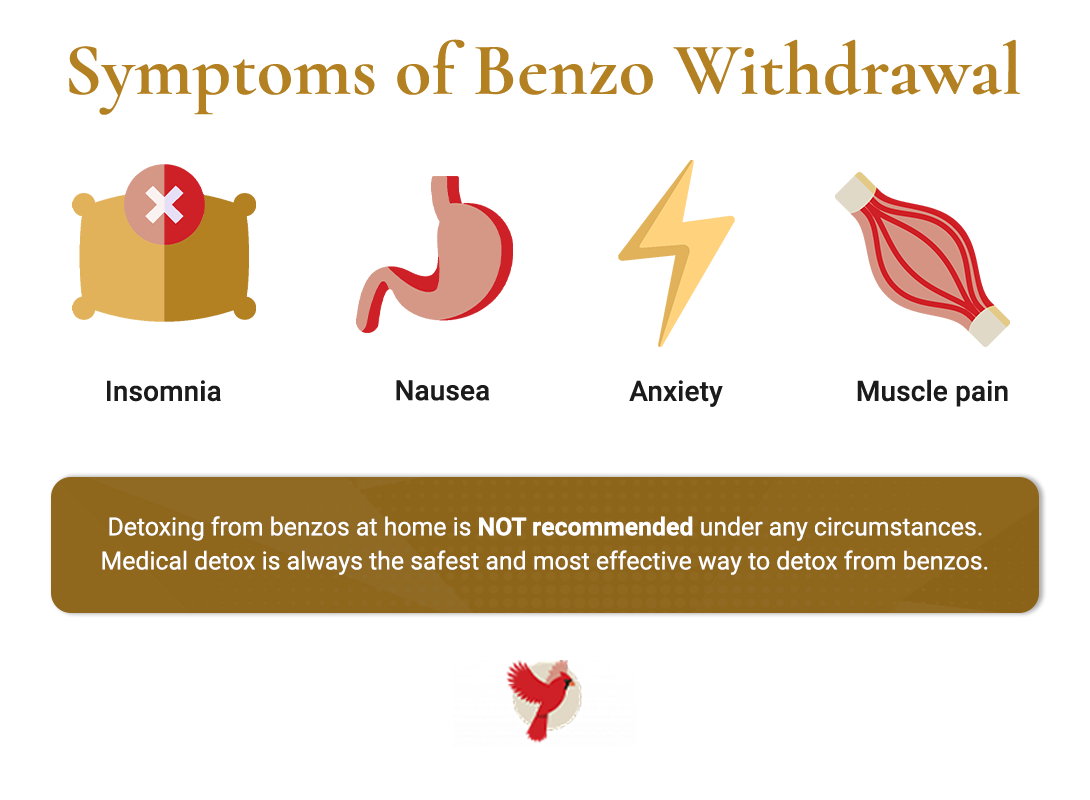In 2018, researchers wanted to understand why people were misusing benzos. 46.3% stated that their interest in taking benzos was to relax or relieve stress, followed by helping with sleep (22.4%). Roughly 5.7% stated they wanted to “experiment” with the medication, and 11.8% stated using benzos to “get high” or because of being addicted. This report also showed that only about 20% of people received benzos from their doctor and had actually obtained the medication through a friend or family member. It’s clear that benzo abuse is prevalent and the drug is widely accessible.
Benzodiazepines pose a serious health risk. While they may be considered safe and effective when used as prescribed, they can cause serious consequences when abused or even combined with other drugs or alcohol. And benzodiazepine withdrawal symptoms can be even worse than those associated with heroin. Individuals suffering from benzo withdrawal symptoms may feel the effects for months or even years after discontinuing the medication. This is what makes a stabilized benzo detox crucial in overcoming benzo addiction. First City Recovery offers medical detox in Kokomo, Indiana.
Commonly prescribed benzos include:
- Xanax®
- Klonopin®
- Atavin®
- Valium®
- Halcion®
- Restoril®

What is Benzodiazepine Dependence?
When benzos are no longer present, withdrawal symptoms can occur. These withdrawal symptoms can be mental, physical, and emotional. When it comes to benzos, there a wide range of withdrawal symptoms can occur. Some symptoms like delirium tremens and seizures are dangerous without the help of medical professionals.
Why Medical Detox May Be Necessary
Medical detoxification (detox) is a process by which benzo-dependent individuals safely withdraw from the drug while under medical supervision. Individuals are prescribed medication to help offset the symptoms. This is important because benzo withdrawal can be both uncomfortable and potentially dangerous.
Medical detox is monitored 24/7 by detox specialists to be sure that the individual is safe and comfortable. Patients reside at the detox facility during the detox so that medical personnel can check in on them regularly and adjust their medications as necessary.

How Do Benzos Affect the Brain?
With long-term use, benzos can cause changes in the brain that make it difficult to feel normal without them. GABA also reduces activities in the brain that are responsible for memory, emotion, and rationalization. This can cause lead to disruptions like memory issues, impulsive behavior, and difficulty breathing.
As the brain becomes used to the levels of GABA when taking benzos it will stop regulating this on its own. Therefore, individuals trying to stop taking benzos will suffer from high heart rates, difficulty sleeping, panic, paranoia, and even delusions as a result.
Symptoms of Benzo Withdrawal
- Anxiety
- Insomnia
- Nausea
- Vomiting
- Headaches
- Mood swings
- Chills
- Sweating
- Muscle pain
- Confusion
- Agitation
- Delirium
- Seizures
- Psychosis
Many of the symptoms related to benzo withdrawal resolve after a few days, however, some individuals can have symptoms that last longer. These are referred to as prolonged or protracted symptoms. It’s hard to determine which people will end up suffering from more serious, prolonged symptoms. Medical personnel can usually determine the likelihood by reviewing the following factors:
- Overall length and severity of the addiction
- If the benzos were mixed with other substances
- If the person is suffering from a co-occurring illness
- Has the person been through a detox program previously
- What types of benzos were being abused and the method of abuse (snorting or swallowing)
- The person’s age, weight, and gender
During the evaluation phase, medical detox personnel will review this information to determine the best treatment plan to approach benzo detox. Each course of treatment is determined on an individualized basis to provide the person with the most comfortable withdrawal experience. Ultimately, detox specialists are working to minimize or eliminate withdrawal symptoms as much as possible.
How Long Does Benzo Detox Last?
Prolonged or protracted withdrawal symptoms can also occur. These are withdrawal symptoms that can last several months or even years. Typically protracted or prolonged withdrawals include emotional and mental symptoms like depression or mood swings.
What is Benzo Tapering?
Benzo tapering is a term used to describe a benzo detox practice where the individual is provided the same benzos causing withdrawal symptoms, then the initial dose is gradually reduced over time. In some cases, longer-acting benzodiazepines are prescribed to replace the shorter-acting benzos causing withdrawal symptoms. Clonazepam or lorazepam are typically prescribed as replacement benzos.

How to Manage Benzo Withdrawal During Detox
Medications Used in Benzo Detox and Addiction Treatment
In addition to other benzodiazepines used to taper individuals off shorter-acting benzos, there are a variety of other medications used to help with detox. These include a wide variety to help stabilize the individual’s mind and body to transition back to normal functionality. Common medications include anticonvulsants, mood stabilizers, antidepressants, and hormone medications.
Progesterone is a hormone medication that helps to alleviate benzo withdrawal symptoms by reducing central nervous system excitability, reducing inflammation and oxidative stress, and promoting the repairing of nerve endings in the brain.
Propranolol is a beta-blocker (medication used to reduce high blood pressure) that can help to treat symptoms of anxiety, insomnia, and palpitations.
Lamotrigine is an anticonvulsant medication that helps to stabilize mood and prevent seizures that can all be associated with benzo withdrawal.
Trazadone is an antidepressant that helps to reduce benzo withdrawal symptoms by reducing inflammation and oxidative stress (caused by benzos).
Valproic acid is an anticonvulsant medication that also helps to stabilize mood and prevent seizures. This medication is commonly used with individuals who suffer from bipolar disorder.
Dothiepin is an antidepressant that helps to reduce benzo withdrawal symptoms by reducing inflammation and symptoms such as anxiety and mood swings. It’s also considered a sedative.
Clonidine is a blood pressure medication that can help to reduce anxiety, agitation, and insomnia which are commonly associated with benzo withdrawal.
Baclofen is a muscle relaxant medication that can help to alleviate benzo withdrawal symptoms by reducing central nervous system excitability and inflammation.
Ondansetron is a medication typically used to treat nausea and vomiting that can help to reduce benzo withdrawal symptoms by reducing inflammation.
Flumazenil is a medication typically used to treat a benzo overdose that can help to reduce benzo withdrawal symptoms by reversing the sedative effects of benzos.
Pregabalin is an anticonvulsant that helps to reduce benzo withdrawal symptoms by reducing central nervous system excitability, reducing anxiety, and promoting repair of the nerve endings in the brain.
Gabapentin is an anticonvulsant that helps to reduce benzo withdrawal symptoms by reducing inflammation and stress.
Carbamazepine is an anticonvulsant that helps to reduce benzo withdrawal symptoms by reducing excitability in the central nervous system.
Can I Detox From Benzos at Home?
If you or someone you love is struggling with benzo addiction, please call us today. We can help you find the addiction treatment programs in Kokomo, Indiana that are right for you.
What are the Next Steps After Benzo Detox?
Treatment programs typically last 30 days or more and may include individual therapy, group therapy, and other types of counseling. By attending an accredited treatment program after detox, you are less likely to relapse. Detox is only the first step in addiction treatment and only breaks physical dependence. An addiction treatment program will free you from psychological dependence by helping you discover your underlying causes of addiction.
Once you’ve completed a treatment program you’ll want to enroll in a sober living facility or continue in an aftercare program. These resources can help you adjust to the real world after your treatment and provide support when you encounter situations that could jeopardize your recovery.


















